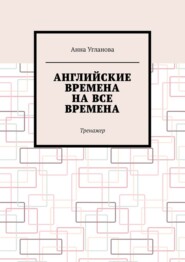скачать книгу бесплатно
____________________________________________________________________
2. You speak Russian.
____________________________________________________________________
____________________________________________________________________
3. We sleep at night.
____________________________________________________________________
____________________________________________________________________
4. He knows French very well.
____________________________________________________________________
____________________________________________________________________
5. She leaves work at 6 p.m.
____________________________________________________________________
____________________________________________________________________
5. Write the correct forms of the verbs using Present Simple.
1. The postman (to bring) ________________ us the newspapers in the morning.
2. I (to hear) ____________ you well. Don’t speak so loudly.
3. I (not to understand) ____________________ this sentence.
4. The train (to start) _____________ at 10 o’clock.
5. We (to begin) _____________ our work at 8 a.m. every day.
6. The coffee beans (to grow) ____________ well in Brazil.
7. Brazil (to produce) ________________ good coffee.
PRESENT CONTINUOUS
She is listening to her friend.
Present Continuous (Настоящее продолженное/длительное) употребляется для выражения действий, которые происходят ИМЕННО СЕЙЧАС, В МОМЕНТ РЕЧИ (now, at the moment), иногда для выражения ближайшего будущего:
I’m watching TV (now).
(Сейчас) я смотрю телевизор.
We are leaving for Moscow tonight.
Сегодня вечером мы уезжаем в Москву.
Present Continuous состоит ИЗ ДВУХ ЧАСТЕЙ!!! —
am, is или are + глагол с окончанием -ing (причастие).
I am reading. – Я читаю (сейчас) —
дословно «Я есть читающий (сейчас).»
am = ’m
is = ’s
are = ’re
am not = ’m not
is not = isn’t
are not = aren’t
Глагол to be (быть) в настоящем времени имеет 3 формы:
am употребляется только с I;
is – только с he, she, it;
are – во всех остальных случаях (т.е. во множ. числе).
6. Fill in the gaps with the verb to be.
1. It ___________________ raining today.
2. The children _______________ playing in their room.
3. Carrie _______________ listening to the news right now.
4. I _______________ having breakfast.
ПРАВОПИСАНИЕ окончания -ing:
К большинству инфинитивов прибавляется окончание -ing:
eat ? eating; play ? playing
Если инфинитив оканчивается на -e, то мы эту -e убираем:
move ? moving; face ? facing
Если в конце глагола стоит гласная + согласная и на этот слог падает ударение, то конечная согласная удваивается:
preFER ? preferring; RUB ? rubbing
НО!
COver ? covering; reMEMber ? remembering
Если в конце глагола стоит гласная + L, то пишем LL независимо от ударения:
control ? controlling; travel ? travelling[2 - American English spelling is traveling]
ЗАПОМНИТЕ!
die ? dying; lie ? lying
7. Write the -ing forms.
work ? _________________; write ? ______________________;
read ? __________________; carry ? _____________________;
sleep ? _________________; go ? ________________________;
leave ? _________________; take ? _______________________.
8. Write as in the example.
I am watching TV.
Am I watching TV?
I’m not watching TV.
1. She is translating this text now.
____________________________________________________________________
____________________________________________________________________
2. You are having lunch.
____________________________________________________________________
____________________________________________________________________
3. They are listening to their director.
____________________________________________________________________
____________________________________________________________________
4. We are waiting for Helen.
____________________________________________________________________
____________________________________________________________________
5. It is raining.
____________________________________________________________________
____________________________________________________________________
9. Complete the sentences.
1. Mark and Jane (to sit) __________________________________________ in a cafе now.
2. It (not to snow) _________________________________________________ outdoors now.
3. We (to wait) ____________________________________________________ for our teacher at school.
4. The girls (to argue) _____________________________________________ about what presents to buy for their Mum.
5. I (to watch) _____________________________________________________ the children playing in the garden.
10. Fill in with PresentSimple or PresentContinuous.
– Hi, Mum!
– Hello, Anna. Where _____________________________________________________ (you, call) from?
– I ________________________________ (be) at work at the moment. My boss _____________________________________________ (have) lunch with his wife now. He __________________________________ (often, take) her to lunch on Tuesdays.
– Well, why _______________________________________________________ (you, phone)?
– No, I just want you to know that I _____________________________ (come) home next Friday.
– What time ______________________________________________________ (your bus, arrive)?
– It ______________________ (leave) at 16.00 and ____________________ (arrive) at 17.00.
– See you on Friday then.
11. Underline the correct item.
1. Do you enjoy/Are you enjoying this party?
2. You haven’t said a word all the evening. What are you thinking/do you think about?
3. He has/is having a tabby cat.
4. I don’t know/am not knowing where she keeps the money.
5. Sarah is German. She is coming/comes from Germany.
6. Leo listens/is listening to the music in his room.
7. If you don’t read/aren’t reading that magazine, I’d like to see it.
